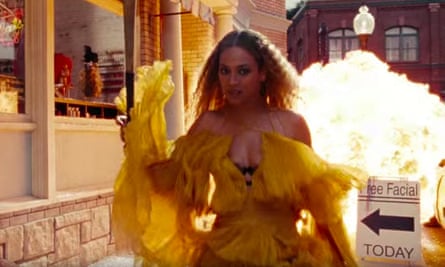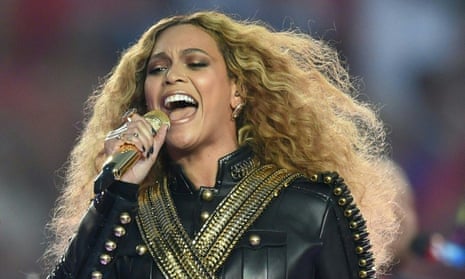“The past and the present merge to meet us here.” So Beyoncé proclaims in teaser videos of her new project, Lemonade. The hour-long HBO special debuted on Saturday night, presenting fans with a whole new “visual album”, her second in that format. Somali-British poet Warsan Shire’s verse from For Women Who Are Difficult to Love links videos for the 12 new songs that make up the singer’s sixth studio album.
The Guardian’s product and service reviews are independent and are in no way influenced by any advertiser or commercial initiative. We will earn a commission from the retailer if you buy something through an affiliate link. Learn more.
The imagery of the superstar’s second visual album is dense, layered, rich and nuanced. Working with directors including Kahlil Joseph, Joans Akerlund, Mark Romanek and longtime collaborator Melina Matsoukas, Lemonade weaves an intricate narrative through image, music and poetry, threading a needle between past and present, interior and exterior lives of black women in America.
Lemonade is gorgeous; an hour-long manifestation of all the conversations you’ve eavesdropped on social media between black women. As if inspired by the #blackgirlmagic hashtag, an expression of pride in the achievements of black women, Lemonade showcases our complex and intimate selves. Lemonade features cameos from some of those women in the pantheon of black girl magic: high achievers like Amandla Stenberg, Quevzanhne Wallis, Serena Williams, Zendaya and Winnie Harlow, the model who has greatly increased the visibility of people with vitiligo.
The journey in Lemonade centers on a movement for Beyoncé – but really all of us black women by proxy – from pain toward healing and empowerment. There are frequent cuts back to images of deep backwoods country, with its majestic cypress trees, juxtaposed with the crumbling, jagged edges of modern urban living. This is familiar territory for black Americans: to southern roots, to nature, a source of healing and of power. Even though the South holds a fraught history between black and white Americans, Lemonade affirms that the call of home is undeniable.
There’s an incredible amount of mystical and spiritual imagery throughout, Beyoncé swimming through water or walking through fire, seeking to purify her troubled soul, negotiating between wrath and peace after being betrayed by her man. In Hold Up, Don’t Hurt Yourself and 6 Inch, flames are everywhere as the scorned woman burns with explosive rage, frustrated by the disappointment of love. For Love Draught, black women form a line march toward the gulf waters dressed in white, and join hands in formation, on a path towards healing.

Beyoncé has tackled these themes before – love, lust, desire, betrayal, pain, empowerment – but never with such boldness or maturity. In expressing her rage and jealousy, she also reveals the inherited, unconscious patterns in women to accept and endure love relationships that leave them unfulfilled, hurt or destroyed.
There’s a fullness and honesty in her expression of modern black womanhood. Beyoncé’s journey begins in an empty field, the lonely and heartbroken woman facing a harsh truth about a man gone missing. There’s the inevitable breakdown and fall, rage and confrontation.
Then, at the centre of Lemonade, there’s a shift as Beyoncé goes on a bus ride with women, again in a kind of formation, whose faces are painted white in the Yoruba tradition of Ori. They are traveling from the urban, developed world to a field. After the protagonist’s spiritual death, the bus ride is a transitioning to an afterlife, a return to home and the source. Beyoncé, speckled with painted white dots, moves with a kind of warp-speed precision that seems beyond human. By repeatedly showing groupings of women in formation, we are reminded that there that there is the power of sisterhood, a community that uplifts and preserves structure when it all seems like it’s falling apart.
Don’t Hurt Yourself cuts between women in formation under a parking superstructure and video portraits of everyday black women from working class communities. She’s bringing visibility to women who are cast aside, underestimated or ignored by the dominant culture. The song underscores this point with a sample of Malcolm X’s 1962 speech Who Taught You To Hate Yourselves: “The most disrespected person in America is the black woman. The most unprotected person in America is the black woman. The most neglected person in America is the black woman.” It’s a speech which carries multiple meanings; the occasion of Malcolm X’s address was the funeral of Ronald Stokes, shot in the back by the LAPD despite reportedly holding up his hands in surrender.
This foreshadows Forward, Lemonade’s most powerful moment, which depicts the the mothers of the Black Lives Matter movement dressed regally and seated in various rooms of an old country mansion, holding portraits of their dead sons: there is Gwen Carr, mother of Eric Garner; Leslie McSpadden, mother of Michael Brown; Sybrina Fulton, mother of Trayvon Martin. Again, the mystical and spiritual reappear, a mardi gras indian dressed in white blessing the seats at an empty table, a quick cut back to women whose faces are painted like the Ori.
This transition leads us to the powerful Freedom, where Beyoncé performs for the gathering of Black Girl Magic, who occasionally appear in formation, dressed in baptism white cotton dresses, and who later are seated at a dining room table in the field – an elaborate dinner party, a safe space for the women to heal.
Building on this sense of connection to family and home, Beyoncé mines her own experiences throughout Lemonade, clipping in real-life home movies showing pivotal, intimate moments with her family. We see her as a young girl talking with her father, and a quick shot of her swollen belly, pregnant with Blue Ivy. Regardless of her stature as pop star or brand, she is reminding all of us that she is human and not immune to conflicts with her partner, or crushing disappointments from her father.
Like Formation, the first single, Lemonade sees Beyoncé drawing on a Southern Gothic aesthetic. At moments, the album echoes a south chronicled in Zora Neale Hurston’s novels and stories, with shades from tales recorded by African American folklorist Virginia Hamilton. It attempts to tell the universal story of black womanhood in the Americas, the story of women who share so much anguish and joy across generations.
It’s clear that Formation was a carefully curated preview for the imagery presented in Lemonade. Beyoncé studies the contrasts and bridges them. Black girls know a thing or two about making lemonade after life hands you a lemon. Beyoncé shares the recipe passed down to her by her mother, who learned it from her mother’s mother. Lemonade, that cool, refreshing drink, a staple to cool the body crushed under the thick, humid heat of the southern countryside. Lemons can heal the body and the mind.
Before the final song, we see a short clip of Beyoncé’s grandmother on her 90th birthday, where she shares how she tried to take what life had given her, defying obstacles and heartache. Like Beyoncé’s grandmother, like Beyoncé, like black American women across time, we are alchemists as much as we are pillars, holding up each other and our communities. We transform lemons into lemonade every day.

Comments (…)
Sign in or create your Guardian account to join the discussion